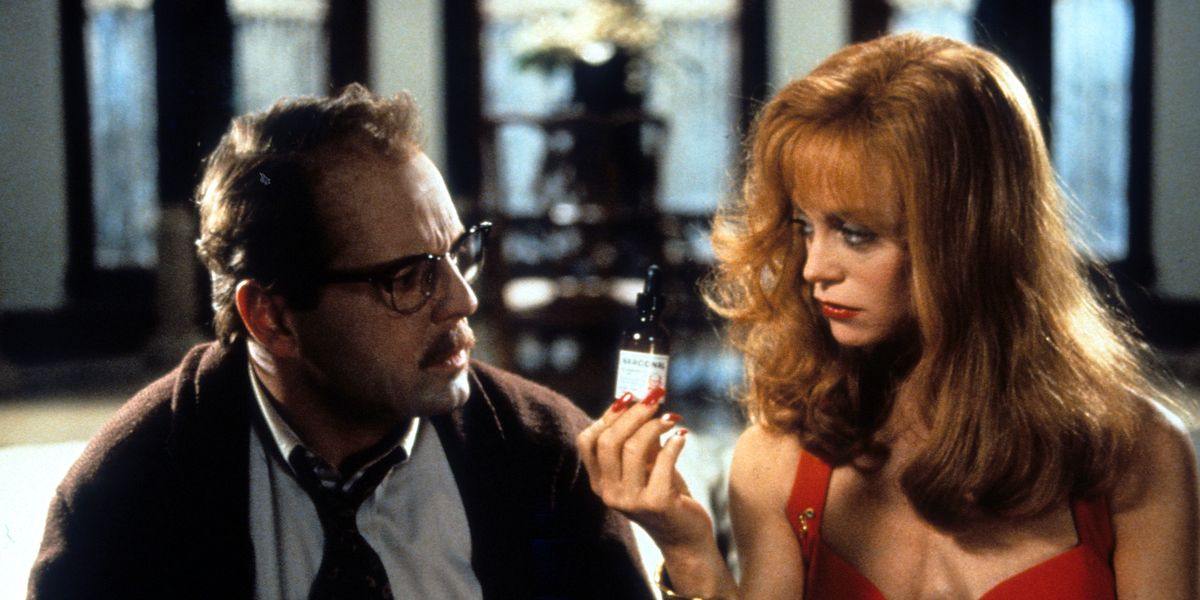There’s good news, if you’re in the market for that sort of thing. Yes, the headlines are apocalyptic (like actually apocalyptic) but this is not the end, at least not according to Madeline Ashton and Helen Sharp’s timeline. Death Becomes Her, the campy dark comedy classic that follows the accidental immortality of two rivals, begins in 1978 and spans 51 years, ending in 2029. So, yes, things may be bleak right now, but we have nine more years until Mad and Hel slip on a can of spray paint outside Ernest’s funeral. Something to look forward to! It’s important to have fictional goals and aspirations.
For instance, I spent much of my life looking forward to October 21, 2015, the date to which Marty McFly traveled in Back to the Future II. I just wanted a hover board and maybe a Max Headroom-themed diner, but instead I got actual Biff Tannen as president, so perhaps I should’ve been a bit more specific. I won’t make that mistake in anticipation of the future date in Death Becomes Her, which like Back to the Future II was directed by Robert Zemeckis, a master of mixing the absurd and the macabre. This time I’m ready for what’s coming.
Well, actually, I’m not really ready, much as I try to be. Who can reasonably say they’re ready for what’s coming? It feels particularly true now in this moment of existential anxiety, but it’s always been the case. And in some lights, it seems that’s the motivating idea behind Death Becomes Her, too. One could argue Madeline Ashton’s (Meryl Streep) most damning mistake was a lack of foresight, but who can blame her? She swans into Lisle’s (Isabella Rossellini) castle, gets beguiled by talk of a potion that will make her eternally youthful, and, failing to suss out the terms and conditions, charges ahead. “Now, a warning,” Lisle says after Madeline downs the potion. Madeline is aghast: “Now, a warning?!” Not for nothing, but this is pretty much how I feel waking up every day:
Me: “Ah, another day of human living and adult responsibility! What joy to exist, briefly, in modern times.”
Twitter/Dr. Fauci/my cholesterol level: “Now, a warning.”
The catch in Death Becomes Her is that the emphasis on the phrase “eternal youth” isn’t on youth, but on eternal. Madeline becomes immortal, whether she wants to or not. And it turns out immortality is not all it’s cracked up to be. Immortality, actually, is pretty annoying.
One of the joys of rewatching Death Becomes Her at a time when an answer—any answer—about the future would be a relief is how cavalier the film is about little matters like life, death, and the fragility of the human body. Yes, I am having my daily existential crisis, but Madeline Ashton’s mannequin paint is peeling on her clavicle and Helen Sharp (Goldie Hawn) has a giant hole in her abdomen. We’re all dealing with something right now, okay?
It’s one of many movies that explore extending our leases on life and the perils therein. And it’s always perils, isn’t it? It’s never “make a deal with a barely-dressed sorceress, cheat death, live happily ever after. Literally.” It’s always “learn a lesson, wish for the confines of mortality, appreciate each moment.” And that’s great advice for us mortals—hard to internalize, a little vague, but great. Thankfully Death Becomes Her, for the most part, skips over any applicable lessons, choosing instead to luxuriate on a concern that’s even more deeply human: the intense satisfaction of nursing a petty grievance. This is what I’m looking forward to in these uncertain times.
The campy combination of Muppet-worthy sight gags and Dynasty-worthy quarreling between two Oscar-winning actresses shifts the film’s emphasis in a way that remains a delight. When Madeline is informed that she is clinically dead at a hospital she moans to Ernest (Bruce Willis), “This is so embarrassing!” When Madeline blows a shotgun hole through Helen, knocking her into a fountain, Helen furiously exclaims, “Look at me! I’m soaking wet!” Part of the movie’s central joke is that these women have misplaced values, but 28 years after the film’s release, I’m more convinced than ever that the real joke is a cosmic one. Helen and Madeline may have imperfect priorities, but they sure are pursuing those priorities with gusto, and that’s got to count for something. Maybe it counts for everything. Take Helen, whose husband Ernest left her for her frenemy Madeline, a floundering former star. Helen spirals for seven years before finding a new lease on life fueled by a little vial of potion and a lot of revenge. She’s not exactly living her Year of Yes, but she’s trying to live into all the parts of herself—the reputable and the shallow, the trivial and the noble. That, to me, is something to look forward to, no matter what comes next.
Life is immense and challenging and beautiful and longer than you think and shorter than you want. It’s also small and needy and sometimes picayune and often frivolous and full to the brim with the nonessential things which, despite their category, prove to be many of the things that make life worth living. When Lisle tries to convince Ernest, a disgraced plastic surgeon, to take the potion, she declares, “Drink and you’ll be able to work again forever!” It’s a strange pitch, but I’m legally not allowed to disagree with Isabella Rossellini. Ernest does, though. “Then what?” he says. “I mean it sounds good, but what am I going to do? What if I get bored?” As someone who is currently living in “interesting times,” I think boredom is getting an unfair rap here. But also, Ernest doesn’t quite see all the opportunities that life, however long, affords: the unique pleasures of a petty grievance, a weird hobby, an awkward work friendship, a stilted ongoing banter with a neighborhood barista, a show to hate-watch, a life full of tiny nonessentials that fill the hole inside.


